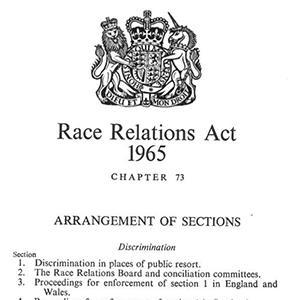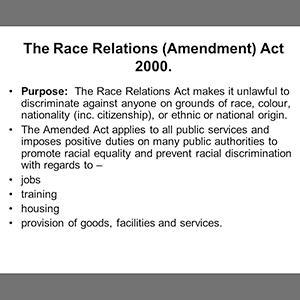Follow the timeline on this page and learn about some of Britain's Black history.
Before 1900
- AD 211

Septimius Severus, the first Roman emperor of African descent, dies in York.
- 1241

Earliest known drawing of a Black Briton is made in the Domesday book.
- 1507

John Blake is a trumpeter in the court of Henry VIII. He is the only Black Tudor we know was pictured.
- 1546

Jacques Francis is hired to retrieve the guns from the sunken Mary Rose. He later becomes the first African to give evidence in an English court of law.
- 1562

John Hawkins is the first Englishman to lead a slave trading voyage. Around 13 million Africans are forcibly taken from their homes in subsequent years.
- 1596

Queen Elizabeth I authorised a merchant to transport black people to Spain and Portugal, with their masters' consent.
However, most refused permission, and more than 360 Africans continued to live in the British Isles.
- 1672

The Royal African Company is granted a charter giving it exclusive rights to carry slaves to the Americas.
- 1688

Aphra Behn publishes her novel Oroonoko about African royalty. She is one of the first to attack the slave trade.
- 1700s

By the mid-1700s sugar is grown entirely by slave labour and is England's biggest import.
It is why some don't want to abolish slavery.
- 1807

The British slave trade is abolished. However, it is still legal to own and buy slaves from slave traders across the empire.
Slave owners were compensated by the government for "loss of goods" for many years to come.
- 1834

All slaves (except in India) are set free. However, they must work for their old masters for free or for low pay until 1840.
- 1884

European powers meet to divide Africa between them.
In many cases the new national boundaries do not take into full account the needs, history or language of the African people.
These decisions often led to war and conflict later on.
The 1900s
- 1913

John Archer is elected Mayor of Battersea, becoming the first Black mayor of London.
- World War 1 (1914 to 1918)

Black Britons took part in every part of the war effort. The most famous is former Tottenham Hotspur player Lieutenant Walter Tull.
- 1919

In Butetown Wales, 2,000 White people attack shops and homes associated with Black people. Many are hurt.
- World War 2 (1939 to 1945)

10,000 men and women from the Caribbean come to the UK to help with the war effort.
- 1948

The Empire Windrush brings one of the largest groups of post-war immigrants to the UK.
British Caribbean people who came to the UK are known as the Windrush Generation.
- 1950s

After World War 2, the British Empire granted India independence in 1947 and split the country into two: India and Pakistan.
The split left between 10 and 20 million people without a home and created a large refugee crisis. Many of those refugees fled to Britain to help fill labour shortages after the war.
- 1962

The Commonwealth Immigrants Act restricts Black entry to the UK.
The act is updated in 1968, 1971 and 1981.
- 1963

Bristol Bus Boycott: West Indians and White supporters refuse to use the Bristol bus service until the service lifted their colour bar.
A colour bar is when a company refuses to employ a person because they are not White.
- 1965

The Race Relations Act makes racial discrimination illegal in public places. Protections are extended in 1968 and 1976.
- 1966

The Notting Hill Carnival is launched by activist Rhaune Laslett to celebrate diversity and help soothe tensions after the 1958 Notting Hill race riots.
- 1970

During a peaceful protest against the unfair police targeting of The Mangrove Caribbean restaurant in Notting Hill, the 'Mangrove 9' were arrested for causing a riot.
The sensational trial lasted for 55 days before a judge ruled against the police and found the activists not guilty.
- 1972

President Idi Amin of Uganda, ordered 60,000 Asians to leave the country within 90 days. More than 30,000 with British passports fled to the UK.
Here, the government explored different ways to stop them from staying, including giving them money to surrender their British passports.
- The 1980s and 1990s

The UK has been home to Somalians since the 19th century when Somali sailors and ship builders migrated to find work in the Royal Navy.
However, when the civil war broke out, the population quickly grew as women and children fled the fighting at home.
By 1999 53% of Somali refugees applied to come to the UK. It is thought the UK is now home to the largest Somali community in Europe.
- 1981

The Brixton Riots occur as tensions rise between the Black British community and the police over alleged police brutality.
Rioting lasts for 3 days and spreads across the UK.
- 1987

The UK elects 4 Black MPs including Diane Abbott, the first Black female MP.
- 1991

Author Stephen Bourne published a book of interviews with Esther Bruce, his mixed-race adopted aunt from Fulham.
It told her life story, including her work as a seamstress as well as her experiences during the Second World War when her father was killed in an air raid.
The book is titled 'Esther Bruce - A Black London Seamstress: Her Story 1912 to 1994'.
It won the Raymond Williams Prize for community publishing and was described by the Caribbean Times as inspirational and enlightening.
- 1998

The first Black manager of a UK national football team, Hope Powell was in charge of England Women from 1998 to 2013, twice reaching the quarter-finals of the Women's World Cup.
Her 20-year playing career included 2 years in Fulham, during which she appeared in the Women's FA Cup final.
In 2003 she became the first woman to achieve the Uefa Pro Licence… the highest coaching qualification.
Widely regarded as one of the finest technical coaches in the country, she's now the Brighton Women's manager.
The 2000s
- 2000

The Race Relations (Amendment) Act is passed requiring police, universities and public authorities to promote race equality.
- 2001

Former Children's Laureate, Malorie Blackman, shot to fame in 2001 with the first book in her Noughts and Crosses series, later a TV series featuring her superfan Stormzy.
Malorie, 59, whose parents were both from Barbados, addresses racism head-on in her books.
"I wanted to show Black children just getting on with their lives, having adventures and solving their dilemmas, like the characters."
- 2004

A prolific composer and conductor of Jamaican descent, Shirley Thompson has written for film, TV and theatre as well as creating operas, concertos, symphonies and ballets.
She has also combined her own creativity with teaching others as Professor of Music at the University of Westminster.
Shirley became the first woman in Europe to compose and conduct a symphony in the last 40 years.
Her 'New Nation Rising, A 21st Century Symphony' was a celebration of 1,000 years of London history and was performed by the Royal Philharmonic Orchestra.
- 2012

From humble beginnings in Somalia, Mo Farah arrived in west London aged 8 and barely speaking English.
Geared along by his PE teacher, Mo came 9th in the under 13s race at the London Youth Games in 1994, then went on to do the long-distance 'double double' at the 2012 and 2016 Olympics - winning gold at 5,000 and 10,000 metres.
Knighted for service to athletics, he switched to the marathon and still trains in H&F with his wife and 4 children.
- 2016

Manchester United footballer, Marcus Rashford, turns 24 in this Black History Month, yet is a household name as a campaigner against child poverty and racism.
From humble beginnings (his mother skipped meals to make sure the family ate), he joined the United academy at the age of 7, and scored twice on his full debut in 2016.
That year he became part of England's Euro 2016 squad.
His campaigning was key to a government U-turn on providing free school meals during summer holidays.